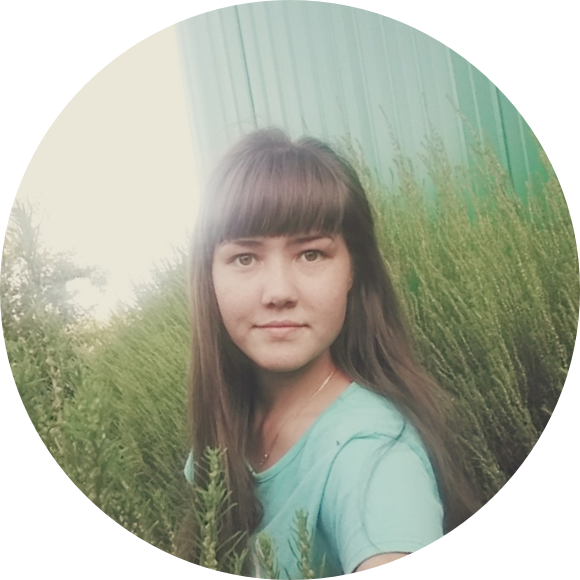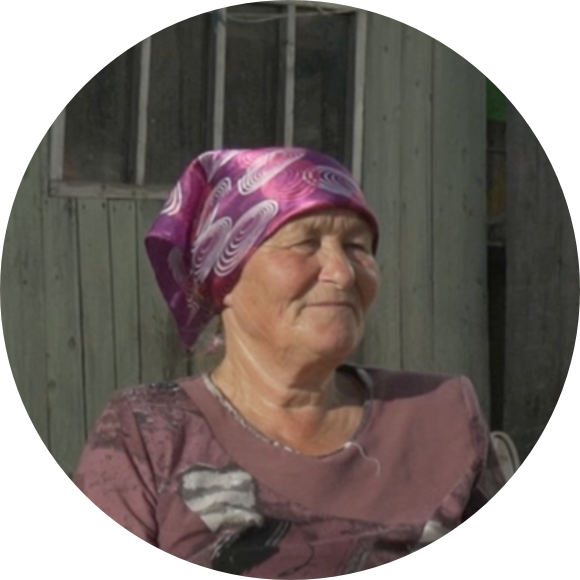When we were children, we played hide-and-seek with the boys. We were all friends. There were always children playing in the streets, and we’d go fishing together and look for mushrooms and blueberries.
I loved animals as a child and wanted to become a doctor. I guess I sort of completed basic education… But I was never able to get a higher education. We just didn’t have the money. My mother had a lot of children. My mother raised five orphans on top of her own three children, so we had very little money.
I wanted to become a doctor because I would often feel pity for sick cats and dogs. I would always take care of them and try to heal them as a child. We kept lots of animals, including cows and calves, and we still have them. When I was a child I took care of them.
My friends and I once traveled to a neighboring village for a few days. On the first day, a boy came up to me and he didn’t leave my side for the rest of the three days we were there.
Later he began to write me letters. Eventually he had to leave for the army, but I was loyal and waited for him.

It took him several years of working in construction to earn enough money for our wedding. Then, we finally got married.
According to Marii tradition, the man should go to the home of the bride, propose, and arrange a wedding date with the family a month in advance. We got married in June, on a very hot summer’s day.
The bride should have a chest full of gifts that serves as a dowry. And then, of course, the bride cries to show she doesn’t want to leave her family home. Nobody ever wants to leave their home, but a young woman has to go somewhere. Luckily, I didn’t have to go far, just 50 kilometers away from our village.
I have three children, two sons and a daughter. I’m very glad to have my youngest child around, otherwise I’d be entirely by myself. The older children have already left home to work and study.
I worked at the local sovkhoz with a senior doctor, but then he traveled back to his village and I was left behind by myself. Of course it was difficult to work alone. At the time, I was young and I really wanted to go to the House of Culture with everybody else. But I’d have to be on call at night. One call, another call.
Still, people really respected me, and I enjoyed my work. And then I got married and moved to a different district, where I began working as a medical assistant.
After my daughter was born, I moved to Kazan, and I worked there as a conductor. It was obviously difficult to change my line of work. But money was tight back then. Yes, the 90s were difficult times. I didn’t even consider working as a medical assistant in Kazan. I immediately began working as a tram conductor and was making some money, at least.
Now I work as a caretaker at our local school, doing all kinds of things. In the winter I make sure the oven is burning. There are 10 teachers in the entire school. I don’t have time to reflect.
But I really miss working at the sovkhoz. Back then, even the ordinary workers were happy to work. The sovkhoz administration would reward us for our hard work, we were given raises, badges and medals. Everyone was upbeat and friendly. You can’t find this sort of friendship and happiness anymore.
We have one House of Culture here in the area, but I would never go without my husband.
He’s a brigadier and is currently serving in a base up north. He’s often gone for up to three months at a time. I used to really miss my husband when he’d leave for so long. When he’s around, we solve problems together and I can share things with him. I often need money and my daughter is in school. Even in a village, you’re a nobody without money; people treat you differently.
When he has days off we usually go to Crimea together on vacation.
In our village women have always been tasked with baking bread and tending to the cattle. But the youth now doesn’t even want to milk the cows or feed the pigs! They’re more interested in the internet. And they all have strange haircuts.
Most of the young people leave our village, there’s just no work here. There’s work in Kazan, but none here.
We celebrate many holidays here, but it’s always the women in our village who put the effort into organizing everything. If it’s a holiday, the men are drunk at the corner shops by the afternoon. Things were more exciting in the Soviet Union.
Of course I miss it. We would all go back to working at the sovkhoz if it were still around. Our sovkhoz was full of energy, and the fields weren’t empty like they are now. In the spring, everything buzzed, the tractors would roar; in the fall, the combines would hum.
Everybody worked, there weren’t any slackers like there are now. We were all workaholics in the Soviet Union. Back then, husbands and wives would go to work together and then go home to have dinner together.
And now? Families fall apart, husbands will come home for just a few days and then spend the rest of the month somewhere else trying to earn scraps. There’s no time to live at this pace!




